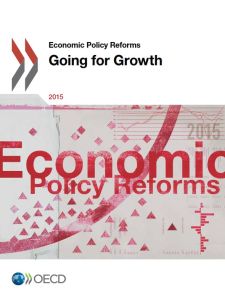Join getAbstract to access the summary!

Join getAbstract to access the summary!
OECD
Economic Policy Reforms 2015
Going for Growth
OECD, 2015
What's inside?
With the right reforms, OECD nations could raise per capita GDP by some 10% – the equivalent of $3,000 per person.
Recommendation
For governments, enacting structural changes in the face of slow economic growth remains a challenge. Still, nations must continue to introduce measures – such as infrastructure investment and labor reforms – that stimulate near-term demand. And policy makers need to ensure that a broad swath of the population, rather than a narrow band of privileged individuals, enjoys the fruits of these measures. This OECD survey of global economies provides a comprehensive look at reforms around the world and offers an analysis of which ones are most effective. getAbstract suggests this timely report to economists, policy makers, and government and business leaders.
Summary
About the Author
The Organisation for Economic Co-operation and Development is an international forum of 34 nations that promotes global economic advancement and trade.


























Comment on this summary